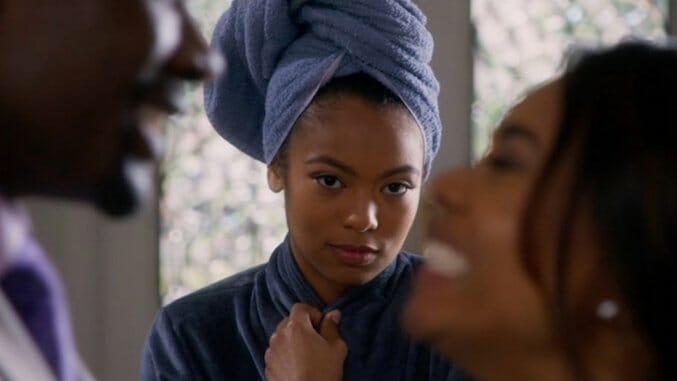Introducing Endless Mode: A New Games & Anime Site from Paste
When it comes to genre movies, sometimes execution is everything. The same basic material can be either trash or art depending on the director’s skill and intent—it’s why John Carpenter’s Halloween is a classic but dozens of inferior slasher films that follow the same basic template aren’t. When the Bough Breaks isn’t necessarily high art, and it isn’t a classic like Carpenter’s film, but it is an impeccably crafted thriller that transcends its lowbrow origins thanks to a solid trio of lead performances and expert direction by Jon Cassar. This is Cassar’s second film this year—the first was the exquisite Western Forsaken—and confirmation that he’s a filmmaker of uncommon talent and versatility.
The plot of When the Bough Breaks is the stuff of hundreds of Lifetime Channel thrillers, as well as studio stalker flicks like The Hand That Rocks the Cradle and Obsessed. Upscale husband and wife John and Laura Taylor (Morris Chestnut and Regina Hall) desperately want a baby but can’t conceive. To solve the problem, they hire beautiful—and seemingly innocent—young surrogate Anna (Jaz Sinclair) to carry their baby. Unbeknownst to them, Anna is planning a scam with her unscrupulous boyfriend, but she has a change of heart when she falls for John—and that’s when the trouble for the couple really starts.
The ensuing plot more or less follows the template laid out by “from hell” movies since Fatal Attraction (this one being “the surrogate from hell” as opposed to the mistress from hell or the nanny from hell or whatever). The pleasure isn’t in the surprises—there aren’t many—but in the variations Cassar, screenwriter Jack Olsen and the cast play on familiar themes. There are a lot of interesting ideas here, particularly when the movie delves into how far John and Laura are willing to go to protect their unborn baby—in some ways Laura’s behavior can be viewed as being nearly as unhinged as Anna’s, and yet on the movie’s own terms her character is utterly plausible. Tonally the movie walks an interesting line; it delivers the goods when it counts, but overall it’s more restrained than something like last year’s The Perfect Guy or a barn burner like Obsessed, choosing to leave key moments off-screen and in the audience’s imagination.
Whether this is purely an artistic decision or partly due to the necessity to deliver a PG-13 rating is unsure, but either way the result is a more ambiguous and complex—and thus more satisfying—entry in the genre than one might expect. Throughout the movie, Olsen and Cassar use the premise’s formulaic nature as an asset rather than a liability. They’re able to swiftly move past obligatory plot developments because they know the audience doesn’t need them labored over—we’ve seen this before, and we know Anna’s going to fall for John, so why draw it out? The appeal of When the Bough Breaks lies in the particulars of behavior and atmosphere rather than the broad strokes of plot, and Olsen and Cassar’s approach yields a final shot that is surprisingly unsettling—John and Laura’s “resolution” is anything but pat.
Striking the right tonal balance between naturalism and melodrama in a film like this is tricky, but the three leads are up to the challenge. Chestnut continues to prove he’s one of the most reliable leading men in show business, while Hall and Sinclair find unexpected nuances in what could have been cheap caricatures. Pulling it all together is Cassar, who uses the widescreen aspect ratio to expressive and dynamic ends. A veteran of countless hours of television on series like 24 and Terra Nova, Cassar has developed an unerring instinct for where to put the camera and how to block his action. Every frame in this movie is sumptuous in its visual design, but it’s not just a bunch of pretty pictures for their own sake. The compositions and camera moves consistently underline or comment on the action, telling us something about the characters and moving the story forward. It’s the kind of craft that’s easy to overlook when it’s done right, as it is here, but painfully obvious when it’s missing. Cassar’s precision and energy is as impressive here as it was in Forsaken, which was in a completely different style and drew on different traditions. To have directed both films in the same year is a feat worth noticing and celebrating.
Director: Jon Cassar
Writer: Jack Olsen
Starring: Morris Chestnut, Regina Hall, Jaz Sinclair, Theo Rossi, Michael Kenneth Williams
Release Date: Sept. 9, 2016
Jim Hemphill is the writer and director of the award-winning film The Trouble with the Truth
, starring Lea Thompson and John Shea. He has written about movies for Filmmaker Magazine
, Film Comment
and many other publications. You can follow him on Twitter.